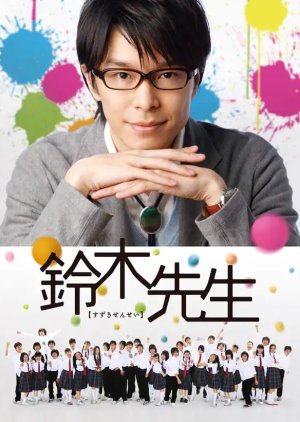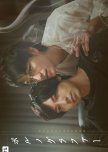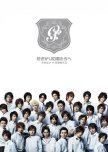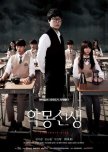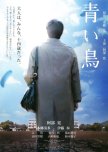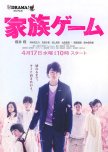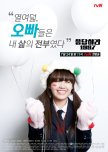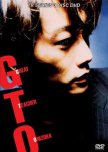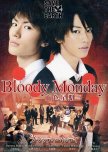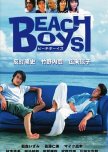
After I finish watching this drama, I'd dare to say it is THE BEST school drama ever made in Japan, if not the best ever made by ANY country. Only one show is good enough to be apple-to-apple comparison with it, namely Kinpachi-sensei (though I just watch one season, the 6th). Both are equally excellent, but for those cannot stand very numerous episode you will most likely end up not liking Kinpachi (it has 23 episodes@ 1 hour!)
OK, let go to the review. It tackles current issues of middle school students in Japan (as well as in my country, actually), including free (minor) sex, freedom of speech, mental age, and even at one episode it involves bullying. Seems unremarkable, isn't it? Unlike many others that trying so hard to agitate audiences' feelings by bombarding them with cliches, Suzuki Sensei comes out naturally. Everything in this drama looks so naturally, from the ambient, dialogues, responses, and even every students...everyone of them looks just come out of reality. Just like what your middle school classmates do in real life, if you had experienced one.
Everything in this drama is also in gray zone, not in black neither white zone of morality, which I really like. Perhaps the most ground-breaking feature of the drama is its way to deliver its message to the masses. Like I mentioned before, this drama does not rely on overused cliches- something like the teacher saying moral message very straightly and everyone cries all the sudden. Middle school kids need logical explanations, and this drama provides and delivers it in good manners. You might be offended by opinions by characters (usually by Mr. Suzuki himself) in this drama, but that's what this drama made for. You will see, the students are becoming more and more open-minded to criticism and others' opinion, and eventually gradually become better person.
Technical-wise, this drama also triumphantly awesome. Hasegawa portrays Mr. Suzuki, the imperfect but smart teacher very well. In fact, this is his best performance so far. The kids are also very well picked. It's not surprising many of the Suzuki alumni become involved in many good coming-of-age shows like this. I'm hoping the kids get their well-deserved breaks, since they are really good. I also enjoy the opening, as well as its soundtrack. They really represent what this drama is all about.
If you identify yourself as a J-drama enthusiast, I urge you to watch this drama. Finally, all of those explanation enough to warrant this show a must watch.
Was this review helpful to you?

Was this review helpful to you?

I stumbled across this drama by accident when I wanted to watch more shows with Kudo Ayano. I read the synopsis for this and it looked like it was going to be another decently entertaining but cliché school drama. So I started it. After about three episodes in I realized that what I had thought to be a rock was in fact a sparkling diamond. This show is a masterpiece.
Since seeing my last favorite drama which was awhile ago I've felt that I wouldn't really have an easy time finding another drama I'd love enough to rate it 10/10. Well, I finally did. The thing is the grade for this show is different even. Most of the dramas I rate ten is because I think they are amazing shows and pretty much appeal to my own special taste. This one is different in that I think any fan of asian dramas could love this. It's hard to explain why this is a special case but after I'm done mabye I've made myself clear enough. In my eyes it should belong with one of the classics, but I know why it won't at the moment. Anyways, forgive me for being long-winded but I've got alot to tell you about this drama and it's going to take some time to describe why it's so great.
Many dramas have this episodic layout which I'm not a big fan of. They have an ensemble cast and in episodes they single out one person at a time to work on his/her problem and in the next they pick another one. All this while keeping an overarching storyline that they focus on in the first episode and then abit later towards the end. The problem with this for me is I have a hard time connecting with the characters and getting invested in the bigger storyline because all the small different stories that happen in each episode take away time from a coherent narrative. Suzuki Sensei looks like one of these shows at first, only it isn't. They do indeed take up a few persons problem each episode, but everything is connected pretty much. Everything is relevant to the overarching story and important things happen all the time and not just in the end. The characters doesn't just have their scenario told and then their done, not at all. They continue to develop and their stories are brought up and not just forgotten plus relevant to where the story eventually ends up going.
This show is very radical. In terms of theme and opinions. It is alot about minor sexuality. It's amazing how well written and real it feels and the problems they take up are very important things that doesn't get talked about because people might feel they are taboo. Well, someone has to talk about them and bring them up. This leads into what might be the best thing about this show. The radical opinions and behavior of Suzuki sensei himself. He presents opinions and views on things that surprised me alot, in fact sometimes I didn't agree but that's the beauty of it. Even though you might not agree with him, in fact you might very well dislike him but what he is saying isn't wrong, it just different from what we are normally told to be the right thing while still being very rational and good opinions.
I have to warn you though, this show isn't very flashy or cartoony like Gokusen or GTO and the likes. It focuses alot on discussion but it's done in a very intense way still due to what must be some of the best writing I've seen in any tv-show. I was never bored.
I recommend this show to anyone who claims to love asian drama. To me this is how a show is done right. I actually learned something from watching this, something important. I won't tell you outright what it is, you are just going to have to watch it for yourself. Actually I think what you and me get out of this might even be different depending on your own view on things.
The cast is amazing, especially considering alot of them are very young. The music captures the mood of the show incredibly well.
I do have one complaint against this show and without spoiling anything it has to do with something that kinda sticks out in a drama that is so down-to-earth as this is. It's a minor thing, you might not even notice and in the long run it didn't matter. But I rather wish it wasn't there at all. Anyways, I'm going to wrap up this review, I feel I could go on for ages about small things that makes this show the masterpiece it is but then I'd be here all night.
I recommend it, it's a definite 10/10. It's not very flashy or "over the top", it's pretty radical and you might even get offended by some of it. Frankly, having your opinions and beliefs questioned is something good because at the end of the day you can chose what to think yourself anyways but you'll get a broader view of the subject by hearing other sides. I'm sad to see so few people having actually seen this here, it's got about 8 rating votes.
Also I recommend you to go into this with an open mind and pay attention to the details, some smaller things might not be spelled out for you. I hope you didn't get bored with my wall of text and I hope you like this show alright at least if you decide to watch it.
Was this review helpful to you?

The story is about our titular character forming a class with chosen students to conduct an experiment. With that we meet his students, the class 2-A and the problems caused that he and other teachers have to deal with. It takes us quite a while to find out what the experiment is about but it does add a bit of a mystery to keep your attention close to whats going on. What is most interesting in what is addressed here is trying to define maturity. Society has set up a certain age to it but from the beginning onwards we do observe how maturity varies from one person to another. Suzuki Sensei's mindset, like most teachers, is not ideal that's for sure, but what distinguishes him from others is his awareness of middle schooler's intelligence and maturity, and his ability to treat them seriously.
On the acting department, oh boy isn't it stunning. It is Hiroki Hasegawa's best role, from his expressions when we hear his thoughts, to his composure when addressing a problem. What's most impressive though are the students. Karin Ono, Honoka Miki, Kaoru Fujiwara, Takumi Kitamura, Yukito Nishii, and Tao Tsuchiya to name a few. That generation sure has a bright future if given the chance. On the teachers side Yasuko Tomita sure was impressive, but generally all did a very decent job.
This drama isn't only for those who enjoy school dramas, it's for everyone. We all can relate to it because we all went through similar phases and looked for a safe place to express our thoughts. Maybe we are all looking for a similar place even now that we grew older so we join clubs or online sites such as MDL for that reason as well. What is discussed here are things that left me thinking about even after watching each episode. It isn't preachy at all and doesn't give us a definite answer which is the beauty of it. The characters and the acting makes it most entertaining to watch.
;)
Was this review helpful to you?

For one, I believe there is one specific moment that makes viewers uncomfortable but really is a moment that also makes you re-evaluate your beliefs. Is he wrong? Is having a fantasy without acting on it a flaw? It also shows you that Suzuki sensei isn't perfect. This drama opens up room for debate about different topics. For instance, Is the fantasy wrong if you don't act on it? These are opinions though that I rarely publicize because as the drama portrays constantly, people are so rooted in their beliefs they leave very little leeway for discussion. Yet at the same time, you have to acknowledge that you are also one of those people rooted in their own beliefs and values.
Hence, this proved a quirky and thought provoking drama with one of the freshest approaches to teaching. Furthermore, it really requires a certain type of maturity from the viewer to really absorb the discussion. Did Suzuki sensei creep me out at times? Yes and that is a testament to my values. Well, to get down to this review.
This story centers around Suzuki sensei. A teacher with a very unconventional teaching method. He must tackle difficult issues that surround his middle school class all while encouraging them to grow. The story is loaded with mature topics that provoke the viewer. It might make you uncomfortable yet also change you. The acting is also strongly believable and while there are some slight exaggerations in regards to the characters and topics, the show retains a rather mundane theme. There are no excessive speeches and exaggerated acting for the most part, which creates a slice of life type of atmosphere that makes it easier to absorb the content. I strongly recommend this, definitely one of the best.
Was this review helpful to you?
This review may contain spoilers
A show that praises unprofessional behavior and lacks logic
This show, despite provoking interesting discussions, is full of unprofessional behavior and fallacies. This review endeavors to defend such claims, analyzing the first chapter of the show. Therefore, this review contains spoilers of the first chapter.I will address three topics, regarding some specific situations. During each of these topics, I will present the facts and then I will give my opinion.
1 - Unprofessional commentaries between Suzuki-sensei and Yamazaki-sensei
FACT 1: Yamazaki-sensei implies twice that Suzuki-sensei has a love interest towards Ogawa, a student. The first time, outside the school, Yamazaki-sensei addressed the commentary towards a teacher from another institution. The second time, inside the school, Ogawa was passing through when Yamazaki-sensei made the commentary.
OPINION 1: it is extremely unethical to imply that a teacher has a love interest towards a student. During the first time, Yamazaki-sensei spread such insinuations to a fellow educator. During the second time, Yamazaki-sensei was reckless, since other teacher or students could hear the commentaries, such as Ogawa.
2 - Unprofessional commentaries of Suzuki-sensei, during the conclusion of the butterfly knife incident
FACT 2: Suzuki-sensei qualifies the violent impulses of Toyama as a "rebellion phase" and suggests him to carry a butter knife.
OPINION 2: It is inappropriate to normalize the situation, qualifying it as a "rebellion phase" or making jokes. If Toyma has violent impulses, it is necessary to properly investigate the causes of such demeanor.
3 - Questionable conclusions reached by Suzuki-sensei, about the "incident" between Misaki Yuki and Toono-chan
FACT 3.1: Suzuki-sensei claims that the consent is based on mental age.
OPINION 3.1: It is the law that defines the criterion for consent, which is chronological age. Moreover, it is difficult to establish a mental age parameter and, it is also difficult to assess such parameter. According to Freud, even children have some kind of sexual behavior. A mental age approach has a huge potential of threatening the physical and mental health of the children.
FACT 3.2: Suzuki-sensei claims that being discovered was the mistake of Misaki Yuki
OPINION 3.2: Misaki Yuki had a sexual relation with a 9 years old girl. This was his mistake. Not being discovered would not change eventual physical and mental issues suffered by Toono-chan.
FACT 3.3: Suzuki-sensei claims that he cannot punish Misaki Yuki because he cannot punish other perpetrators.
OPINION 3.3: the fact that you cannot punish all crimes do not entail that you should not punish any crime. Law is a model. You have to endeavor to fulfill this model. Analogically, you should punish a murderer, even though you cannot punish all murderers.
FACT 3.4: Suzuki-sensei leads Misaki Yuki to the conclusion that he and Toono-chan are children (mental age), because: Toono-chan fails to keep the secret and lies about the abuse; Misaki Yuki made the mistake of trusting Toono-chan.
OPINION 3.4: revealing secrets and telling lies while in pressure are not behaviors only made by children. In addition, having your trust betrayed do not entail that you are a child. Adults frequently trust people who end up betraying them. Therefore, it is possible that Misaki Yuki and Toomo-chan have an adult mental age. However, such situation is not proved. Moreover, Toomo-chan is still physically a child.
Was this review helpful to you?

